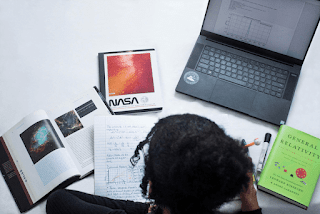The Central American - Caribbean Bridge in Astrophysics (Cenca Bridge) is a nonprofit organization established in the state of Tennessee in the United States with the mission to create and develop astronomy research opportunities in Central America and the Caribbean. Opportunities to pursue astrophysics in the region are few with only a handful of programs offering master’s in physics with a concentration in astronomy. Cenca Bridge connects undergraduates from Central America and the Caribbean to mentors and advisors overseas in hope that they have the choice to pursue astrophysics as a profession. Every year, Cenca Bridge holds the remote internship program, where undergraduate students from the region apply to be selected for a 3-month long paid research internship. As the only organization to provide a paid research remote internship, it is important to highlight the contributions that many women in astrophysics from Central America and the Caribbean have already contributed to our field.
In this series, we will highlight selected fellows. If you'd like to learn more about the program and ways you can get involved please visit https://cencabridgeastro.weebly.com/.
 |
| Reading is crucial |
At 12 years old, I read One Hundred Years of Solitude and began to learn about the history of independence in South America. Gabriel Garcia Marquez’s books actually sparked a number of interests in me, and the history of military government has been one of them. Being knowledgeable and passionate about social issues pushed me toward studying law and pursuing a career as either a lawyer or a political figure. I wanted to study and work on something that I truly felt passionate about. I started university with a major in criminal justice, believing I wanted to be a lawyer. As I navigated the reality of how the career would be, I realized it was not for me. I changed my major to literature, believing a career in writing would suffice. But that did not feel challenging or fulfilling enough. Then, in 2019, my father tragically passed away. That loss really set me back and made me wonder what exactly I wanted to do with my life. My dad always told me I was capable of anything I set my mind to. Despite how encouraging he was, I was utterly lost for a while. While completing general requirements for the degree I was pursuing at the time, I took a pre-calculus class required for the degree, and there I rediscovered how much I enjoyed problem-solving and research. After that, a physics class revived my passion for astronomy and became the last piece that solidified my direction. As I continue to delve into the field, I fall more in love with it. In the future, I hope to become an astrophysicist. As difficult as classes and topics can be, it feels exciting and fulfilling to combine all my skills in this fascinating field.
How did you first become interested in astronomy or planetary science?
I first became interested in astronomy and planetary science at a young age, thanks to my older siblings who shared their knowledge from school. The joy of receiving my first telescope and gazing at the moon for the first time is probably the earliest memory I can trace my passion for understanding the universe to. For a couple of years, I struggled with finding the right career for me, one that could challenge me and utilize the skills I love. It was during my second year at university, while taking a pre-calculus class, that I rediscovered my passion for problem-solving and research. A subsequent physics class solidified my direction, leading me toward the field of astrophysics.
 |
| A passion for problem-solving and research |
What are your aspirations?
I aspire to be a research astrophysicist, as well as a mentor and inspiration to others, especially young women and minorities, to pursue their passions in the STEM fields. I also aspire to publish my writing on a variety of topics, ranging from science to politics and philosophy, as well as some works of fiction. In this way, I hope to make a lasting impact on the scientific community and society as a whole.
What are you currently working on?
I am studying physics at Arizona State University and participating as an intern on the Cenca Bridge Remote Internship. In this internship, I am assisting with research on circumgalactic mediums. The project consists of writing a program that uses artificial lines to locate emissions within the circumgalactic medium. I am currently working on establishing a strong foundation in tool knowledge, specifically Python for data science. Since programming is so vital for research, I am taking my time to ensure that I can understand and work with it smoothly and efficiently.
I am studying physics at Arizona State University and participating as an intern on the Cenca Bridge Remote Internship. In this internship, I am assisting with research on circumgalactic mediums. The project consists of writing a program that uses artificial lines to locate emissions within the circumgalactic medium. I am currently working on establishing a strong foundation in tool knowledge, specifically Python for data science. Since programming is so vital for research, I am taking my time to ensure that I can understand and work with it smoothly and efficiently.
 |
| More reading! |
One thing I absolutely love and believe is very important is reading. I enjoy reading scientific articles for school and work, but I also make time, usually in the morning or at night, to indulge in a little pleasure reading. Currently, I have a pocket collection of all Sylvia Plath’s poetry and read one poem every morning. It’s important to me to have these moments to connect with what I love, as it makes me feel alive. It’s as important and intuitive as brushing my teeth.
What community issues are important to you and why?
I aim to be a conscious citizen both in the realm of science and in the social context. Growing up in a governmental housing assistance program has made me aware of the many injustices that systematic prejudice has inflicted on us. Besides caring about those very real issues, I care about the lack of support the science community suffers from. Not only because it affects me, but because this is the community that propels humanity forward. They are vital for the advancement of knowledge and a sustainable future. It is truly bothersome how science these days is disregarded as a suggestion. That’s one of the consequences of the lack of support. I care about these issues because I want a society that is fair to every member of it and values their contributions.
What are your near-future plans?
Looking ahead, my near-future plans involve furthering my education and research in astrophysics, working towards a Ph.D., and actively engaging in scientific exploration.
No comments :
Post a Comment